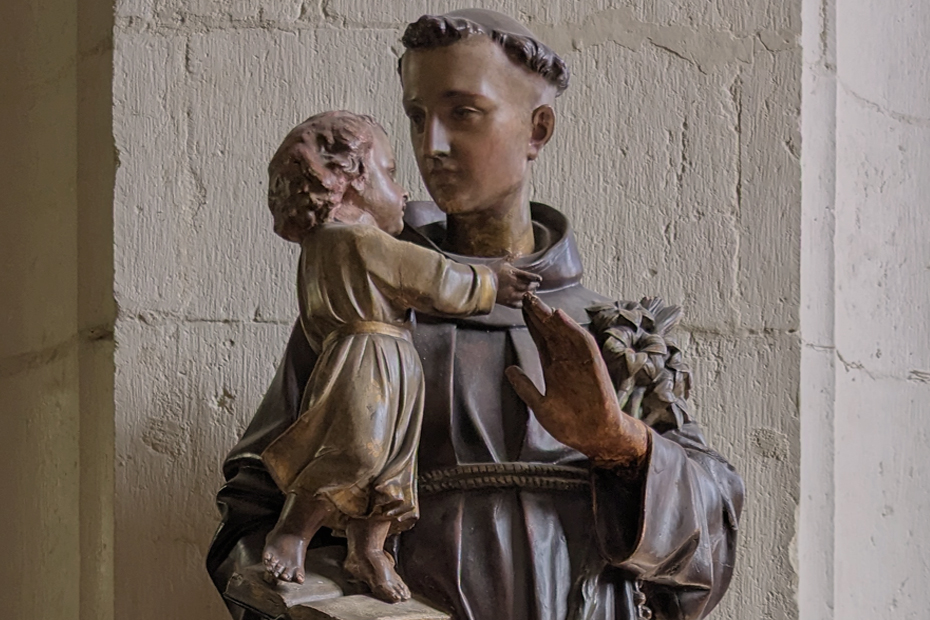By Susan Ciancio
On June 13, we celebrate the life of an amazing saint—a saint who once said, “Of what value is learning that does not turn to love?”
Chances are you have said many prayers to this saint, especially when in need of finding something that has been lost. A common prayer for his intercession asks: “St. Anthony, St. Anthony, please come around. Something is lost that needs to be found [mention the lost item].”
That’s right, St. Anthony of Padua is the patron of lost items, and though we often seek his intercession for material things that are lost, we can also seek his intercession for souls who are lost or who are in danger of becoming lost. Why? He knew all too well the dangers we face when we turn our backs on God or fail to learn enough about Him, as he spent many years preaching to lost souls who could not rest until they rested in God.
Who was St. Anthony of Padua?
Born Fernando in 1195 in what is today Portugal, Anthony began his religious life at a St. Augustine monastery. For many years he learned and studied, but an encounter with Franciscans changed the course of his life. He felt so inspired by those he met that he became a Franciscan.
Anthony soon became known for his preaching and the eloquent way he spoke to others. According to the website of the Franciscan Friars of the Atonement, “The ‘fire’ within him became evident. His knowledge was unmistakable, but it was the passionate manner in which he spoke that truly impressed everyone.”
Anthony was an inspirational teacher who knew how to talk to others and lead them to Christ. The Franciscan Friars website goes on to say that “Anthony preferred to present the grandeur of Christianity in positive ways. It was no good to prove people wrong: Anthony wanted to win them to the right, the healthiness of real sorrow and conversion as well as the wonder of reconciliation with a loving Father.”
He spoke not with anger but with joy and love. After becoming a Franciscan priest, he spent the rest of his life preaching and teaching about God and spending countless hours hearing confessions. It is said that he took nearly 400 trips to Italy and France to preach to heretics and to convert minds and hearts. His sermons grew so popular that churches couldn’t hold the amount of people who wanted to listen. The Franciscan site explains, “The crowds were so great—sometimes 30,000—that the churches could not hold them, so he went into the piazzas or the open fields. People waited all night to hear him. A bodyguard was needed to protect him from the people armed with scissors who wanted to snip off a piece of his habit as a relic.”
Many qualities made St. Anthony so dynamic, but it was mostly his unwavering love of God and his ability to articulate that love that drew others to the Catholic faith.
Passing love on to children
Those who heard St. Anthony preach were deeply affected by his words and convictions. Countless were converted, and untold lives were changed. The joy he felt as he taught was infectious.
That joy and love of the faith are what we should strive to pass on to our children. We can only do that if we too live with that same fire St. Anthony had. And then we must teach with love and excitement.
At the Culture of Life Studies Program, that’s one of the things we try to impart with our lesson booklets. Church teaching can be complicated, so we break it down for young people to understand. We teach age-appropriate concepts that they can wrap their minds around, and we try to present them in interesting ways. We conclude each booklet with discussion questions not because we want to quiz your child but because these questions spark conversations and help them think. Once they begin to think about these topics, they can start to articulate their thoughts and beliefs.
The more they do this, the more eloquent and like St. Anthony they become and the more they can influence others.
So as we think about the life of St. Anthony, the love he spread, and the lives he changed, let us use his example to inspire us to draw our children to the faith and to do our very best to teach them.
“Of what value is learning that does not turn to love?”
Learning about our Father in heaven and about the Catholic faith must lead us all to love—love of God and the faith, love of others, and love of ourselves. This is the only way we can save souls and retrieve those who are lost.
